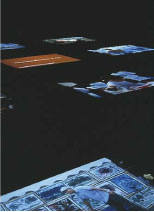
|

|
| Reporter : Beda Faessler |
|

|
At
the entrance of the exhibition a huge glass
table with small white elements catches the
eye, in fact it occupies almost the whole
room.
The visitor is invited to experiment with
the elements by plugging them together to
create special qualities and shapes. At second
glance there are six small monitors at the
opposite wall. As the space extends to the
outside terrace one can see there a original
scale model made out of six of these elements.
That's all at first. |

|

|

|
|
| For an architect with several
huge projects and buildings under way and
realized during the last few years this
is quite surprising. Although these important
projects are presented at the second floor
of the exhibition area by slide projection
onto tables and by the interviews on the
small screens, the major impact is clearly
reserved for these white elements. What
is the importance's of these elements?
At the opening of the exhibition Riken Yamamoto,
Hiroshi Hara and Toyo Ito each delivered
short speeches which clarified the intent
of the exhibition. On occasion of the competition
for a new town hall in Ora city in 2002,
Hiroshi Hara was one of the Judges and took
the chance to demand for a sustainable flexible
construction system which allows the participation
of the town people in the architectural
process. The white elements form is the
base of the proposal by Yamamoto which was
chosen for realization. They came to be
called the Ora-element. |
|
 |
Rather than just
being one more try in participating architecture,
Yamamoto stresses that this kind of working
together with local residents is only successfully
possible by the architect having a very strong
concept and clear vision about the final result
and the process leading towards it. In this
matter comes to mind the straightness, Toyo
Itoh chooses to stress in his speech about
Yamamoto. With this clarity and a strong sense
of what to reach Yamamoto is able to use this
Ora-element as a kind of communication tool
to be able to discuss the architecture of
the future town hall with people involved
regardless of their knowledge in construction
and design.
The quality of this element is two folded,
it serves as a communication and design tool
on one hand as explained above. On the other
hand it is an extremely flexible construction
element allowing for changes during the process
of building and even after that during the
whole life time of the building which obviously
makes it very sustainable. |
|

|

|

|
|
|
| Thinking While
Creating / Creating While Thinking, and
quoting the title of chapter one of the
published book of the exhibition, The Process
Itself is Architecture, hint to another
important aspect. Yamamoto seems to targeting
with his latest works a wider understanding
of what architecture is or should be and
aims to overcome the classic view of the
architectural work being mainly reduced
to produce isolated sculptural buildings.
Consequently he works with opening up and
integrating the building into its physical
surrounding as well as looking for a dialogue
with the social and functional surrounding.
This second aspect might be even more important
as it forces the architect to confront and
articulate social and political aspects
and problems as well.
In this circumstances the Ora-elements are
loaded with symbol and manifest character
in the process of development another approach
to architecture.
|
|
|
|